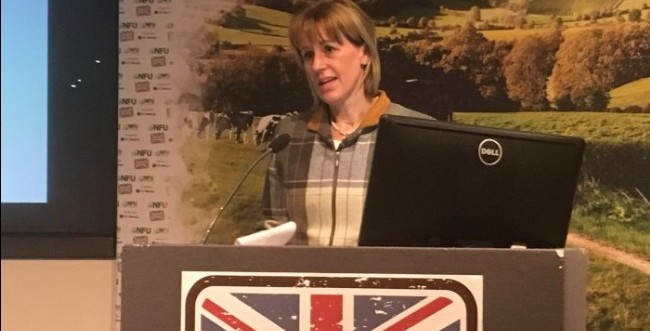New NFU president Minette Batters has called on the Government to put farming at the heart of its Brexit negotiations in her first major speech in the role.
Addressing politicians, food and farming industry leaders and journalists in Westminster, she outlined her vision for agriculture, stressing why she believes ‘farming’s future must be one based on teamwork, working with you all as Team Agriculture’.
“Welcome to a new era for the NFU, a new dawn for the countryside, and a new time for farming,” she said.
“We are on the cusp of enormous change. This is a moment of huge significance for Britain and for the farming community alike.”
Alongside Deputy President Guy Smith and Vice President Stuart Roberts, she added: “The technological change we are seeing and the march of Brexit will be felt in our fields and farms more keenly than in any other industry. We must move forward, and we must adapt.
“For my part, I am committed to delivering a bold and ambitious future for British farming.
“My mission is to take British farmed food and drink, the best in the world, and open it to export markets in a new agricultural revolution. But before I can do that, I need to reconnect farming with the British public and celebrate the reasons British people should be proud of Britain’s farmers.”
“We are open for business, and we must get our fantastic produce to market, at home and abroad. And our moment is now.”
Public good
The Wiltshire beef farmer, who has held the role of NFU deputy president for the past four years, set out why she believes food production is a public good and should be recognised as such in the public policy arena. She acknowledged that the industry has seemed ‘out of step with the British public’ in the past and, not quick enough to respond to the changes in society.
“But those days are, long gone,” she said. “We know the British people expect high animal welfare standards, responsible environmental stewardship and good quality, traceable and affordable food. Our own UK market has demanded ever greater food safety regulation and as farmers and growers we’ve risen to that challenge – that’s why we believe that the food we produce is a public good.”
Moving onto Brexit, she was keen to highlight the opportunities it presented for food and farming in the global marketplace, alongside the obvious challenges it presents for the industry.
She said: “Today, I am calling on the whole of Government to help us put Britain on the global map when it comes to farming. I want to be involved in Brexit trade negotiations, and for farming to be the first to take its place in this new buyers’ market.
“However, we must not turn our back on the EU market, it remains crucial for British farmers, with 40% of our lamb, 80% of our dairy exports and 75% of our wheat and barley exports currently going into Europe. It is vital we have zero-tariff, frictionless trade with the EU market place.
“Just as they have promoted British industry and defence interests abroad, our Ministers now need to stand shoulder to shoulder with farmers and push British agricultural goods.”
Turbo charge
Brexit was also an opportunity for ‘turbo charging the Red Tractor’, she added.
“We are on the cusp of an agricultural revolution,” Mrs Batters said. “We have the story, quality and the standards to lead a global revolution on data use, and traceability that will transform the way we sell our products at home and abroad. To be that world class industry we need evidence demonstrating traceability, standards and safety to be available at the click of a button.”
She concluded by laying out the four themes for the new officeholder vision for a new agricultural policy.
- A vision for working with Government and other stakeholders to ensure British farming becomes the envy of the world;
- A vision that will see British farmers enhance the natural environment, and improve our soil health – protecting our iconic countryside;
- A vision that will feed even more families in every part of Britain with safe, high quality and affordable food, driving productivity and innovation across the sector; and
- A vision that will see us champion British farming at home, in Europe and throughout the globe.
In a question and answer session following her speech, she expanded on why she believed UK agriculture had an opportunity to rebuild its self-sufficiency in food, which has fallen to around 60%. She also reiterated the need for frictionless trade with the EU and warned of the threat to the industry posed by lower standard imports under future trade deals.




